The heirs of May 1968? - Protest and Progress in the Balkans
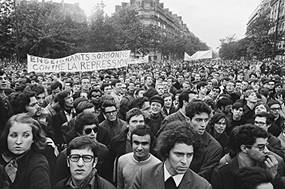 |
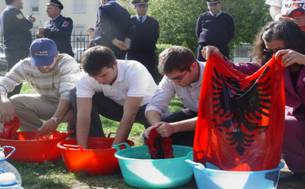 |
|
Protesters in Paris May 1968 |
Police watching the ritual cleaning of the Albanian flag in Albania 2006 |
Dear friends of ESI,
40 years ago images of protest, which had started at a university campus in Paris, went around the world. One student, Daniel Cohn-Bendit, had been threatened with disciplinary measures for insulting a visiting government minister. Demonstrations followed. By the end of May there were street protests and barricades in the very centre of Paris. There were also clashes with the police on May 11th and May 25th 1968.
And yet it was the non-violent nature of these protests which marked them out. This was fundamentally different from previous rebellions in European cities. In fact, as some contemporaries noted (or complained) the Paris events were "more a party than a revolution." Historian Tony Judt noted that "what the slogan writers of May 1968 never do is invite their readers to do anyone serious harm."
In a recent article Daniel Cohn-Bendit described the aspirations of his generation:
"The change brought by 68 affected, above all, traditional culture, hidebound moralism, and the principle of hierarchical authority. It altered social life, ways of being, ways of talking, ways of loving, and so on. But, despite its scope, the movement steered clear of violence in order to create a new mode of rebellion. Students, workers, and families - all had their legitimate demands, and all nonetheless converged on the same desire for emancipation. The revolt was a form of political expression, but its aim was not to seize political power as such."
At the same time he expressed his doubts about any "hasty comparison - and even less the identification - of every protest today with 68":
"After 40 years, the context has changed radically. The world of the cold war is gone, as are schools and factories organized like barracks, authoritarian trade unions, gay bashing, and women's obligation to receive permission from their husbands before being able to work or open a bank account. That world has been replaced by a multilateral world, which includes Aids, unemployment, energy and climate crises, and so on. So let's permit new generations to define their own battles and desires."
But are there not today some legitimate heirs to the ambition to create non-violent "new modes of rebellion"? In recent years, one of the most interesting protest movements in Europe has emerged against all odds in Albania, on the very periphery of the continent, and still little noticed in the rest of Europe.
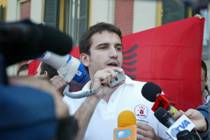 |
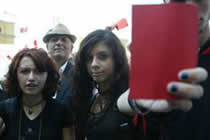 |
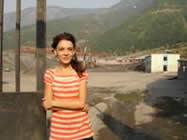 |
|
Erion Veliaj – one of the founders of Mjaft |
Mjaft protest in Albania |
Elisa Spiropali – part of the new Mjaft leadership – in the Albanian mining town Bulqiza |
The story of Mjaft
The story of Mjaft – its first generation of founders and its (even younger) second generation of new leaders – is at at the centre of the documentary film Albanian Renaissance.
Since 2003 the movement Mjaft (Enough in Albanian) has triggered resignations of ministers, brought huge crowds into the streets of Albania, and redefined the very nature of protest. It has also received international recognition (including the 2004 UN civil society award).
When Mjaft was set up in Albania in 2003 it also felt at times more like a party than a revolt. But this was in itself a revolutionary message. In post-communist Albania with its difficult transition, protest against authorities had long been associated with violence, even the threat of anarchy. As one of the founders of Mjaft, Arbjan Mazniku, told us:
"Protest in Albania was associated with requesting either a change of regime, or of government. It was often violent. Protesting was also 'totalitarian', people went out only in extremely large numbers, requesting complete solutions to their problems. MJAFT! has influenced the change of that mentality: towards peaceful, often funny or sarcastic protests focused on a specific issue."
Mjaft was not set up to bring about regime change as was the goal of Otpor in Serbia. There was in fact no longer an Albanian dictator to overthrow. Activists did not have to risk their health or careers. Their smart and provokative campaigns focused on concrete issues: targetting dangerous waste dumps, specific irresponsible behaviour by politicians, safety conditions in mines or on roads.
Mjaft campaigns (often) worked because they were both imaginative and took place in a largely benign environment. To join Mjaft one did not need to be a hero. What really mattered was to want to be a citizen. It is this which makes the story of Mjaft since 2003 of interest beyond Albania. And it is the goal to shake "civic apathy" and to bring about a change in culture and attitudes that echoes the aspirations in a now distant Paris 40 years ago. A leading British feminist, Sheila Rowbotham, noted that in 1968 she and others "rediscovered the capacity to hope": they woke up to see that "things were not immutable, even though change might not come in ways you expected."
In this sense, certainly, the young protestors in Albania today are heirs of Cohn-Bendits generation: changing their country and in the process changing also its image in the outside world.
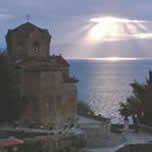 |
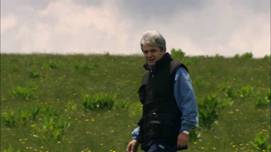 |
|
Lake Ohrid |
Former rebel leader turned party leader Ali Ahmeti |
The future of Macedonia: a letter to the Nato General Secretary
In recent weeks many citizens of the Republic of Macedonia felt abandoned, discouraged and worried to be left behind in an unstable neighbourhood. The Greek veto on extending an invitation to Macedonia at the recent NATO summit in Bukarest was a shock to the people of this small candidate country.
On 19 May 2008 a group of 20 European and American policy makers and analysts – including Soren Jessen-Petersen, former Special Representative of the Secretary General and UN Administrator in Kosovo, and former EU Special Representative to Macedonia. Mort Abramowitz, former US Assistant Secretary of State, Edward P. Joseph, former Director of the International Crisis Group and Mark Leonard, the Director of European Council on Foreign Relations - articulated their concern in a letter to the Nato general secretary Japp de Hoop Scheffer:
"It is our view that continuing to protract Macedonia's entry to NATO could have serious consequences for that country's stability and for its neighbor, Kosovo. We believe that the converse is equally true; that issuing Macedonia a prompt invitation to membership would send a most welcome signal of reassurance to all parties in Macedonia who are cooperating in good faith to maintain that country's multiethnic character. A NATO invitation would simultaneously send a timely and necessary signal of caution to all those in and outside the region who would like to keep open the question of final borders in Macedonia, Kosovo or elsewhere in the region.
The letter continues:
"After fifteen years of mediation, the issues and obstacles to the Greek dispute over Macedonia's name are well-known. Identity issues have plagued the region since the violent break up of former Yugoslavia began in the early 1990s. NATO played a crucial role in averting major conflict in Macedonia in 2001. A key component of the Ohrid Peace Agreement was the painful concessions to the Albanian minority on identity. Mounting more pressure on the Macedonians to make additional concessions on their identity could be counter-productive."
 |
 |
 |
|
Prime Minister Nikola Gruevski |
Musicians Kitanovski and Rashid |
Leader of the Opposition Radmila Sekerinska |
Documentary film "Macedonian wedding / the war which did not take place"
The next Balkanexpress documentary film will be broadcast on 3 Sat this coming Sunday (21 o'clock). It also focuses on Macedonia.
For this film we talked to Macedonians in all walks of life: from prime minister Nikola Grueski to former rebel leader Ali Ahmeti, from the leader of the opposition Radmila Sekerinka to EU foreign policy chief Javier Solana, Defence Minister Lazar Elenovski and international Jazz musician Toni Kitanovski. Workers, farmers, textile entrepreneurs, students, mayors, soldiers, migrant workers, nurses all appear. Together they introduce a little known country and tell of its dramatic moment in 2001, its continuing difficulties and its surprising success story in rebuilding a multiethnic reality. It is a story a wider European public deserves to hear.
One clip – on the crisis in 2001 – can already be seen on our website. Many more clips, portraits and background material will all be on the ESI film website www.returntoeurope.org from this weekend on.
 |
 |
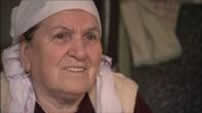 |
|
EU diplomat Ben Crampton |
Kosovo activist Albin Kurti |
Kosovo farmer Zema Rrahmani |
Kosovo film website – Cutting the Lifeline
We are further expanding our bilingual website on the Return to Europe documentary project. You can find excerpts from the film, including an appeal by the head of UNMIK to allow further work migration from Kosovo.
There are portraits of key actors and places in Kosovo. And there is background on many issues, including Migration and remittances, Patriarchal families, Kosovo as Cradle of the Serbian nation, some information on Kosovo Serbs today, on The road to independence, UNMIK, Ahtisaari and Kosovo independence and on KFOR
FAZ article on a "remarkable documentary series"
 |
 |
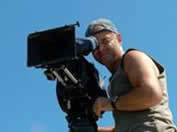 |
|
Return to Europe script writer Wolfgang Stickler |
The sound of Albania |
Cameraman Werner Veits |
Last Friday the German quality daily Frankfurter Allgemeine Zeitung published an article on the Balkan-Express documentary series and the Albania film in particular. It noted:
"There is probably no country in Europe where there is as great a gap between the perceptions that are held abroad and the reality today. A foreigner who arrives by plane in the year 2008 is first stunned by the spotlessly clean airport and then by taxi drivers who, at the end of a ride, ask for the previously agreed price and not some absurdly exorbitant figure – wouldn't it be nice if the taxi drivers in Athens and Bucharest were to emulate their counterparts in Tirana? Today's Albania is a far cry from the violent lawlessness that rocked the country a decade ago."
The article also has kind words about the series itself:
"Villages that are disappearing and on the other hand, cities struggling to cope with mass migration from rural areas – this contrast can also be seen in the other episodes of the remarkable series, "Return to Europe". The concept was largely developed by the European Stability Initiative, a think tank based in Berlin and Istanbul, whose analyses of the Balkans are among the best of what is written about the region."
This is certainly an inspiration to us to continue to provide you with interesting analysis, in reports and films.
Many best regards,
![]()
Gerald Knaus

Gerald Knaus
